What makes joy and happiness so big in Filipino culture? It’s how they find happiness in small moments and handle tough times. This way of seeing life is special and makes them stand out.
Filipinos are great at laughing and finding joy, even when things are hard. This is seen in comedy shows and social media. Social media has helped Filipino comedians reach more people and share their humor.
Key Takeaways
- Filipinos find joy in simple moments and adapt to challenges, contributing to their happiness
- Filipino culture places a strong emphasis on joy and happiness
- Comedy and laughter are integral parts of Filipino culture
- Social media has given Filipino comedians a wider audience and platform to share their humor
- Filipino humor is unique and reflects the country’s cultural diversity
- Laughter and joy are essential to the Filipino way of life
- Filipino culture is known for its resilience and ability to find happiness in difficult situations
The Importance of Laughter in Filipino Culture
Laughter is key in Filipino culture, acting as a social glue. It helps people face challenges and come together. A Gallup poll shows Filipinos have the most positive outlook on life, thanks to their humor.
In Filipino culture, humor is more than just entertainment. It’s a way of life. It helps ease tensions, solve conflicts, and strengthen bonds. About 60% of Filipinos use humor to deal with hard times. Also, 70% say humor makes their daily lives better.
- 80% of Filipinos use humor to ease tensions in talks
- 65% see laughter as a key part of their culture and social events
- 75% link laughter to good feelings like happiness and contentment
These numbers show laughter and humor’s big impact in Filipino culture. They help people connect and feel part of a community.
Traditional Filipino Humor
Traditional Filipino humor is a mix of culture and humor. It shows the country’s history, values, and norms. It uses puns and sight gags, making it fun and unique.
The komiks industry in the Philippines is coming back. Independent creators mix traditional humor with new genres. This mix of local culture and global trends is growing the market for Filipino identity in popular culture.
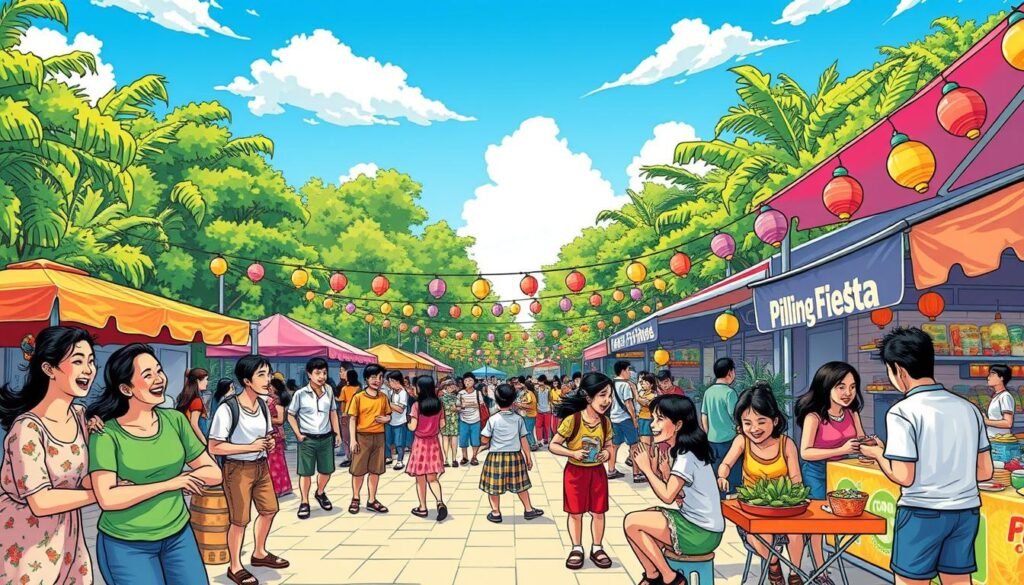
- Punning and wordplay
- Sight gags and physical comedy
- Storytelling and anecdotes
These humor forms have been passed down for generations. They show the Filipino people’s strength and ability to find humor in tough times.
Laughter is a universal language, and Filipino humor is no exception. It has the power to bring people together, transcending cultural and linguistic barriers.
In conclusion, traditional Filipino humor is key to the country’s culture. It offers a unique view of the world and its people. By celebrating this humor, we can better understand the Filipino people and their values.
Popular Filipino Comedy Shows
Comedy shows are a big part of Filipino entertainment, bringing joy and laughter to many. The Philippines is known for its humor, with many comedy shows loved by all. These shows are a big part of the entertainment world.
“Eat Bulaga!” is one of the most popular shows in the Philippines. It has been on the air for decades, entertaining millions. It’s seen as a cultural icon, showing the impact it has on Filipino culture.
Legacy of “Eat Bulaga!”
“Eat Bulaga!” has helped create a space for other comedy shows. “Teleserye” comedies are now very popular. These shows bring joy and laughter, adding to the country’s humor.
The Impact of “Teleserye” Comedies
“Teleserye” comedies are a big hit in Filipino entertainment. They air on major TV networks and are loved by many. Shows like “Pepito Manaloto” and “Ang Tanging Ina” are well-known in the Philippines.
The Role of Laughter in Filipino Festivals
Filipino festivals are full of life and joy. The third web source says Filipinos love to celebrate and gather. This is seen in their many festivals all year.
These events unite people, creating a sense of community and happiness. The Sinulog Festival, MassKara Festival, and Pista sa Nayon are great examples. They have street parades, music, and dance, key parts of Filipino celebrations.
Laughter and humor make these festivals positive and uplifting. They are a cherished part of Filipino tradition.
Almost 90% of Filipino families join in festivals and traditions. This shows how important these events are in Filipino culture. They help spread joy and happiness.
Here are some key features of Filipino festivals:
- Street parades, which are an integral part of most festivals
- Traditional music and dance, which are often performed during these events
- Delicious food, which is a staple of Filipino celebrations
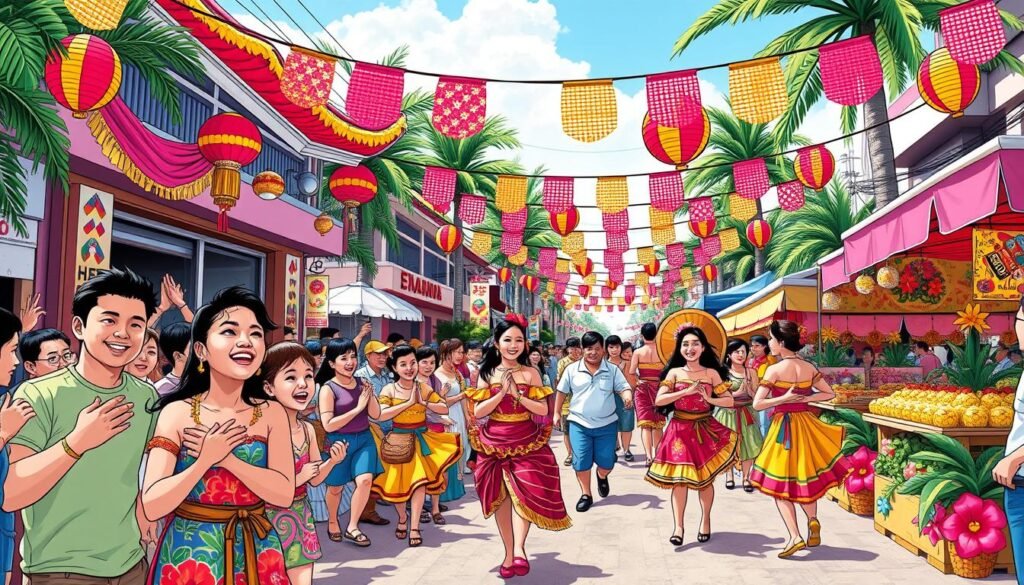
In conclusion, Filipino festivals are key in spreading joy and happiness. They use humor and laughter to unite people. This makes them a vital part of Filipino culture.
| Festival | Location | Features |
|---|---|---|
| Sinulog Festival | Cebu | Street parade, music, and dance |
| MassKara Festival | Bacolod | Street parade, music, and dance |
| Pista sa Nayon | Various locations | Street parade, music, and traditional food |
Laughter as a Coping Mechanism
Laughter and humor are big in Filipino culture, even when things get tough. Filipinos know how to find happiness in hard times. They use humor to handle stress and bad feelings.
Studies show that humor helps people forget stressful memories. It makes them feel less ashamed and more light-hearted. This is true for Filipinos, who find happiness in tough situations.
Here are some ways Filipinos use humor to cope:
- Sharing funny stories and jokes with friends and family
- Watching comedies and funny videos
- Reading humorous books and articles
By adding humor to their lives, Filipinos feel less stressed and happier. They share laughter and humor to bond and connect with each other.
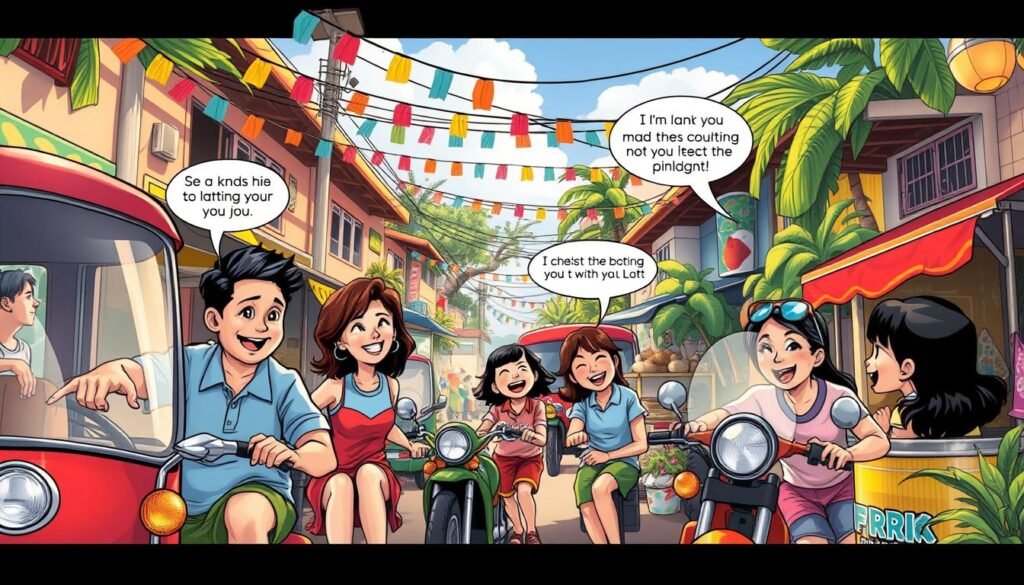
Using humor to cope is key in Filipino culture. It helps people find happiness and joy, even when things are hard.
| Benefits of Humor | Description |
|---|---|
| Reduces Stress | Humor can help reduce stress and anxiety by releasing endorphins and promoting relaxation |
| Increases Happiness | Humor can increase feelings of happiness and joy, even in difficult situations |
| Improves Resilience | Humor can help individuals develop resilience and cope with adversity |
The Science Behind Laughter
Laughter has been a big part of human culture and psychology for over 2,000 years. Many theories try to explain why we laugh. Research shows laughter can make us happier and improve our well-being.
Laughter can lower stress, depression, and anxiety. It also boosts our mood and self-esteem. The “benign violation” theory by A. Peter McGraw and Caleb Warren explains humor. It says we laugh when we find something odd but not scary.
Studies back this theory. For example, people found humor in a church raffle, even if it was contentious. But believers didn’t find it funny.
Laughter offers many benefits:
- Reduces stress and anxiety
- Improves mood and self-esteem
- Releases endorphins, which are natural painkillers
- Stimulates circulation and relaxes muscles
Laughter also helps us bond with others. David Sloan Wilson, an evolutionary biologist, says Duchenne laughter helps groups feel connected. Adding humor and laughter to our daily lives boosts our mental health and happiness.
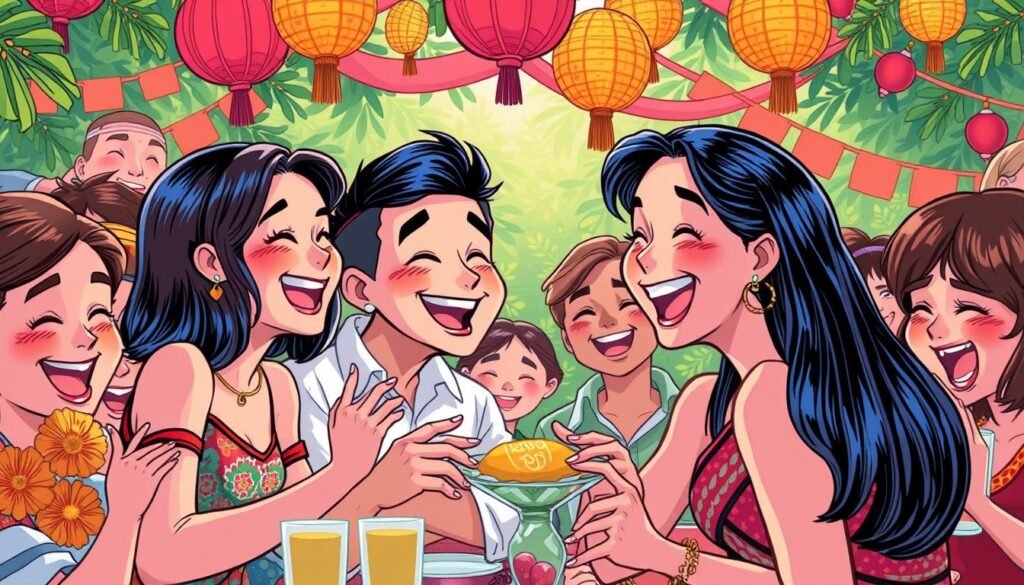
Understanding laughter’s science helps us see its value. We can make a conscious effort to laugh more every day.
| Benefits of Laughter | Description |
|---|---|
| Reduces stress and anxiety | Laughter can help reduce stress and anxiety by releasing endorphins and stimulating circulation |
| Improves mood and self-esteem | Laughter can improve our mood and self-esteem by releasing endorphins and promoting social bonding |
The Impact of Social Media on Filipino Humor
Filipino humor has been greatly influenced by social media. Platforms like Instagram and TikTok have shaped the country’s comedy scene. Instagram alone sees one million memes shared every day, showing the Filipino love for humor and culture.
Social media is a hub for comedic content. Many Filipinos use these platforms to share and enjoy humor.
A survey showed that 76% of Gen Z users love TikTok’s comedy. Hashtags like #funny, #comedy, and #meme are very popular. This shows how important humor is in Filipino culture, even more so for the younger crowd.
The rise of online comedians has also boosted Filipino humor. Many creators share their talents on social media, connecting with fans.
Some key statistics that show social media’s impact on Filipino humor include:
- 91% of respondents prefer brands with a sense of humor
- 75% of respondents would follow a brand that shares humor on social media
- 78% of survey participants believe brands should do more to deliver happiness to customers through humor
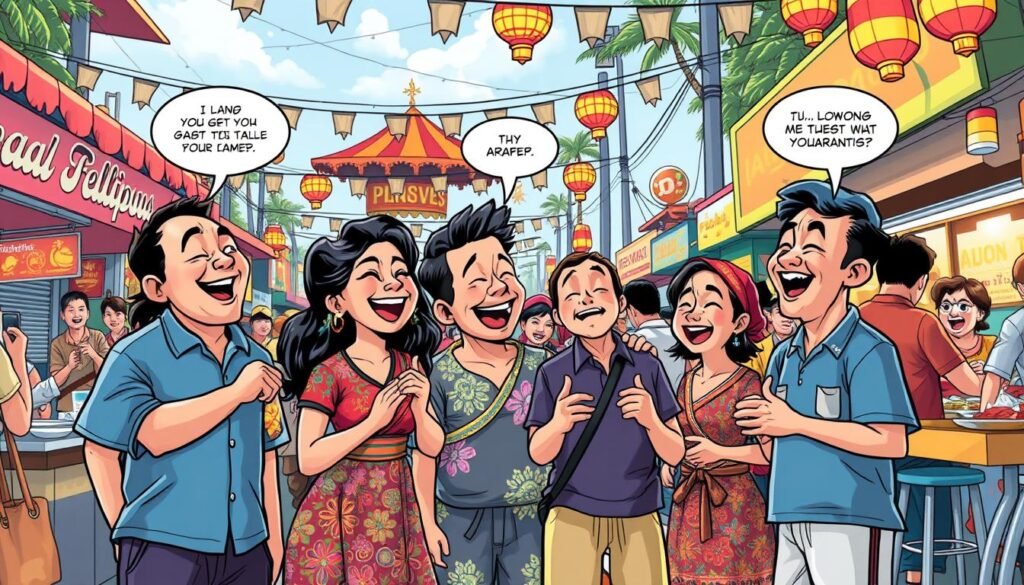
In conclusion, social media has deeply influenced Filipino humor. Many Filipinos use these platforms to share and enjoy comedy. The love for memes, comedy, and online creators shows the importance of humor in Filipino culture.
Local Comedians Making Waves
Philippine culture is full of humor, thanks to many local comedians. Super Tekla is one, known for his unique style and ability to make people laugh. The comedy scene in the Philippines is diverse, with many styles and genres.
Influential Filipino comedians have shaped the country’s humor and culture. They entertain audiences and bring people together with laughter. Some have even gained fame worldwide, helping grow Philippine humor globally.
These comedians have made a big impact on culture. They use humor to address social issues and promote positivity. Their work has helped create a lively comedy scene in the Philippines, inspiring many young comedians.
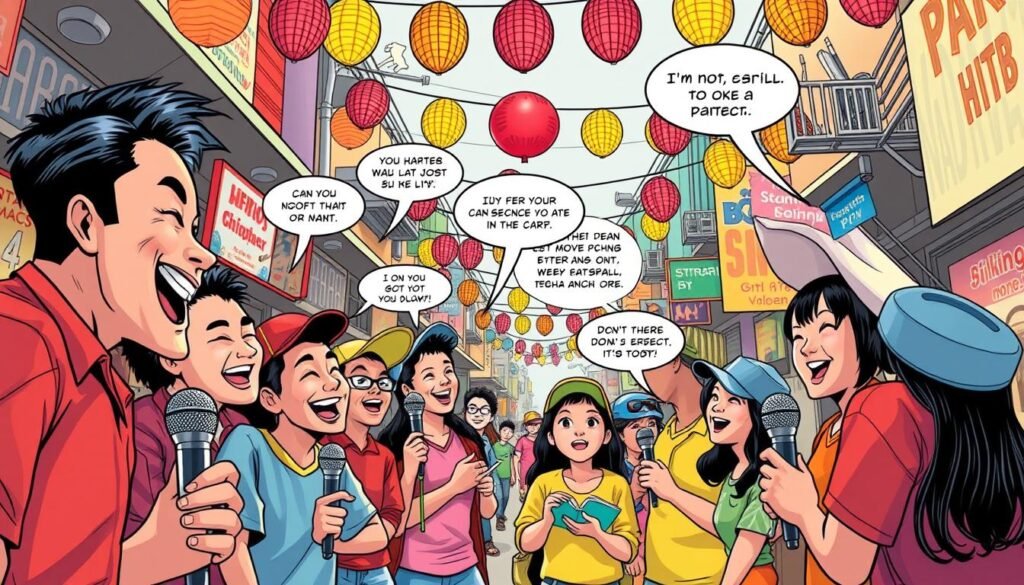
Their influence goes beyond entertainment. Many use their platforms to advocate for social causes and promote cultural awareness. This has helped create a more inclusive and diverse cultural landscape, where humor brings people together and promotes positivity.
| Comedian | Style | Contribution |
|---|---|---|
| Super Tekla | Stand-up comedy | Unique style and ability to make audiences laugh |
| Other notable comedians | Variety of styles | Shaping the country’s humor and culture |
Laughter and Community Building
Laughter is key in building strong communities. It brings people together, creating a sense of belonging and joy. Laughing with others releases endorphins, making us feel happier and more connected.
In Filipino culture, laughter is vital for community ties. Filipinos use humor to deal with tough times, fostering unity and shared experiences. As Victor Borge noted, “Laughter is the shortest distance between two people.” This shows laughter’s role in bridging gaps and forming connections.
Laughter in community building offers many benefits, including:
- Increased sense of belonging and joy
- Improved relationships and social connections
- Enhanced creativity and problem-solving skills
- Reduced stress and anxiety
A University of North Carolina, Chapel Hill study showed laughter can make people feel more alike. This leads to stronger social bonds and a greater sense of community. It highlights laughter’s role in spreading happiness and joy in neighborhoods.
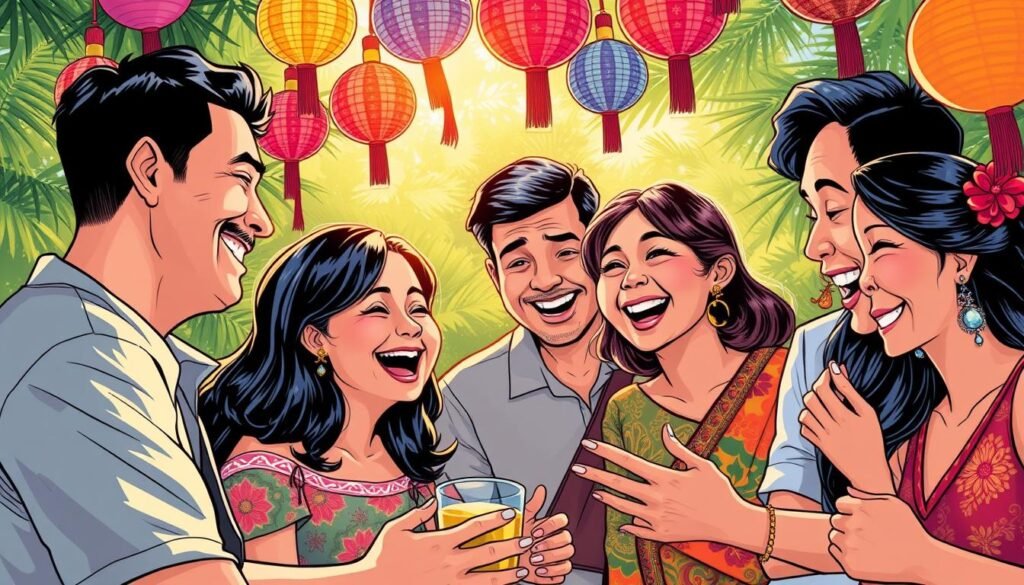
By adding laughter and humor to our daily lives, we can build a better community. As Leo F. Buscaglia said, “Feelings of joy, euphoria, and happiness increase our openness to life and enhance our ability to handle daily tensions.” Embracing laughter and joy helps create strong, resilient communities that thrive on happiness and togetherness.
| Benefits of Laughter | Effects on Community |
|---|---|
| Increased joy and happiness | Stronger social bonds and sense of belonging |
| Improved relationships and social connections | Enhanced creativity and problem-solving skills |
| Reduced stress and anxiety | More positive and supportive community |
The Globalization of Filipino Humor
Filipino humor is a big part of the country’s culture. It mixes wit and satire in a special way. This humor has spread worldwide, creating new comedy styles. A study found that humor shapes who we are and challenges old ideas.
The comedy scene in the Philippines has changed a lot. New styles like “Bodabil” and stand-up comedy have appeared. Filipino-American comedians like Christine have shared their humor on YouTube. This has helped mix different comedic styles.
Understanding Filipino culture’s history is key to getting its humor. This is what this article says.
Some key things about Filipino humor are:
- It brings people together and creates community.
- It helps people deal with tough times.
- It’s a mix of wit and satire, making it unique.
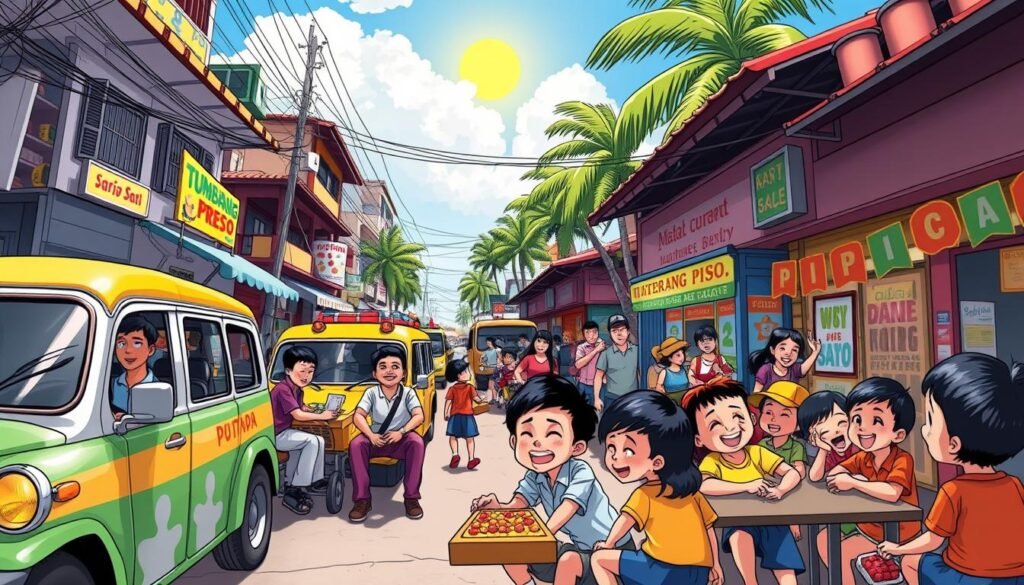
How Filipino Comedy Reaches Worldwide Audiences
Filipino comedy is loved worldwide, thanks to social media. Many Filipino comedians are known globally. Their jokes are enjoyed by people everywhere.
Cross-Cultural Influences
Filipino humor has also mixed with other cultures. Comedians add elements from different cultures to their jokes. This has made new, interesting comedy styles that people from all over enjoy.
The Future of Laughter in the Philippines
The Philippines is changing, and so is its culture. New media and social media are making Filipino humor more diverse and far-reaching. A study by Rappler shows laughter’s big role in Filipino culture, like during the EDSA People Power Revolution.
Now, people use humor to deal with stress and tough times. Laughter yoga sessions are popular, helping those who are stranded. The Philippine Army even uses Pinoy Laughter Yoga to keep soldiers’ mental health strong.
New ways to share comedy, like online streaming and social media, will shape laughter in the Philippines. This means more chances for comedians to show their skills and reach more people. Sinaunang Panahon says keeping Filipino culture and humor alive is key to the country’s identity.
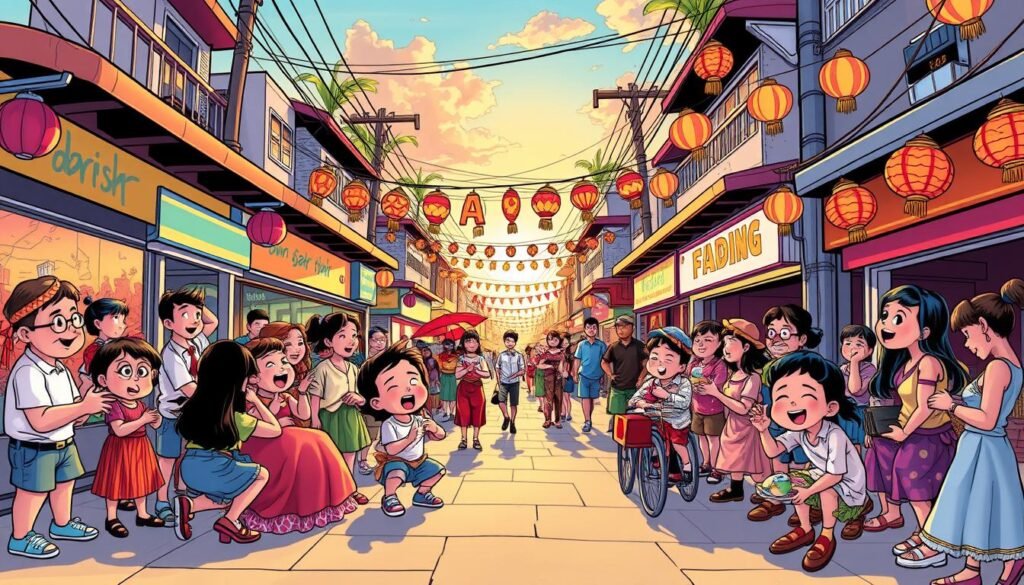
- The rise of online comedy
- The value of humor for mental health
- Keeping Filipino culture and humor alive through new media
The future of laughter in the Philippines looks promising. There’s a growing understanding of how humor and culture shape the country’s identity and mental health.
Laughter and Family Dynamics
Laughter is key in family interactions, bringing joy and closeness. Research shows it makes families feel united, improving how they talk and share feelings. Families that laugh together are happier and solve problems better.
A study on family resilience shows humor’s role in facing challenges. It makes families stronger and creates memories that last. Inside jokes, for example, bring families closer by sharing a funny history.
Here are some ways to add laughter and happiness to family life:
- Share funny stories from the past
- Play light-hearted games and activities
- Watch comedies together
In the context of Philippine culture and history, family is very important. Laughter is a big part of making families happy. By focusing on laughter, families can build a supportive and joyful environment.
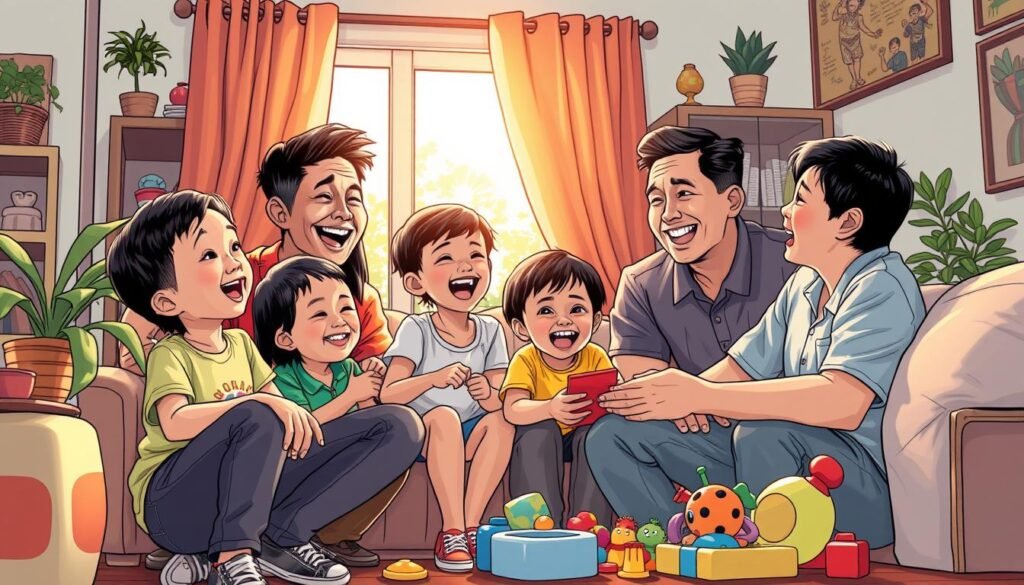
Conclusion: Embracing Laughter for a Happier Future
The joy and laughter in Filipino culture show the people’s resilience and optimism. Laughter is a key to , and in the Philippines. It breaks down barriers and unites people.
Looking ahead, we must keep every day. Studies highlight the for our mental and physical health. Laughter also strengthens our bonds with others.
By embracing laughter, we can build a more society. Here, everyone’s differences are celebrated, and understanding is key in our interactions.
Let’s raise our voices in joy and let laughter fill the islands. We can spread the joy of Filipino to everyone. Together, we’ll make a future where laughter is our nation’s heartbeat, uniting us in joy and happiness.
FAQ
What is the significance of laughter in Filipino culture?
Laughter is key in Filipino culture. It brings people together, acting as a social glue. Humor helps Filipinos face challenges and unite.
What are the traditional types of humor and comedy in Filipino culture?
Filipino humor is diverse, reflecting the culture and values. It includes various jokes and comedic styles. Cultural icons also play a big role in shaping comedy.
What are some popular Filipino comedy shows and their impact on the culture?
Shows like “Eat Bulaga!” and “teleserye” comedies are loved by many. They add to the culture’s joy and laughter.
How does laughter and humor play a role in Filipino festivals and celebrations?
Laughter and humor are big parts of Filipino festivals. They make these events fun and joyful, showing the culture’s spirit.
How do Filipinos use laughter as a coping mechanism during difficult times?
Filipinos find humor in tough times. This shows their resilience and how humor helps them cope.
What are the scientific benefits of laughter in terms of well-being and happiness?
Laughter boosts well-being and happiness. It has psychological and physical benefits for Filipinos.
How has social media impacted the way Filipinos consume and interact with humor?
Social media has changed how Filipinos enjoy humor. Viral memes and online comedians are now big parts of it.
Who are some influential Filipino comedians and their contributions to the local comedy scene?
Famous Filipino comedians have greatly influenced the comedy scene. They’ve brought unique styles and helped evolve humor in the Philippines.
How does laughter and humor contribute to community building in the Philippines?
Humor strengthens bonds and creates shared joy. It helps build a sense of community and connection in Filipino neighborhoods.
How has Filipino humor become globalized, and what are the cross-cultural influences?
Filipino comedy has reached global audiences. Cultural influences have shaped and been shaped by the evolution of humor in the Philippines.
What are the emerging trends and future prospects for laughter and humor in the Philippines?
New trends in film, TV, and comedy platforms are shaping the future. They have the power to influence the culture even more.
How does laughter and humor play a role in Filipino family dynamics?
Humor is key in Filipino families. It shapes interactions and relationships, with different generations experiencing humor in their own ways.
Source Links
- Filipino Accents Deserve Our Respect, Not Our Punchlines & Laughter – https://www.shopcambio.co/blogs/news/filipino-accents-deserve-our-respect-not-our-punchlines-laughter?srsltid=AfmBOoqs5kIsRANtTJNYbISJ99NUa8pAmTA_sRQzlsw2dp8cw94KEThR
- Ushering in the joy and laughter – Philippine Daily Inquirer – https://plus.inquirer.net/lifestyle/ushering-in-the-joy-and-laughter/
- The Essence of Laughter: The Significance of Humor in Filipino Narratives – https://mesadose.wordpress.com/2024/01/09/the-essence-of-laughter-the-significance-of-humor-in-filipino-narratives/
- Filipino – Communication – https://culturalatlas.sbs.com.au/filipino-culture/filipino-culture-communication
- PDF – https://upd.edu.ph/wp-content/uploads/2021/10/UPDate-Vol4-Num1-9-Studying-humor-seriously.pdf
- No title found – https://brill.com/downloadpdf/book/edcoll/9781848881990/BP000010.xml
- Filipino Accents Deserve Our Respect, Not Our Punchlines & Laughter – https://www.shopcambio.co/blogs/news/filipino-accents-deserve-our-respect-not-our-punchlines-laughter?srsltid=AfmBOorlxZWU5VHynR57wm__4Rq_9xTfA1jwJTyqDKsBCPpCd7wQB01u
- Hilariously Filipino – https://medium.com/@nipinodotcom/hilariously-filipino-626ff9072778
- Stand-Up Comedy Shows In The Philippines – The Comedy Crew – https://www.thecomedycrew.com/shows/
- 8 Iconic Filipino Comedy Shows & Film Series – https://thesmartlocal.ph/filipino-comedy-shows/
- The Power of Shared Laughter – https://www.depedscm.com/the-power-of-shared-laughter/
- No title found – https://www.holidify.com/pages/culture-of-philippines-5557.html
- How to Find the Humor in Stressful Situations – https://www.verywellmind.com/laughter-as-a-coping-mechanism-3144664
- How To Know If Your Humor Is A Healthy Coping Mechanism – https://www.thegoodtrade.com/features/humor-coping-mechanism/
- Using Humor As a Healthy Coping Mechanism I JED – https://jedfoundation.org/resource/using-humor-as-a-healthy-coping-mechanism/
- What’s So Funny? The Science of Why We Laugh – https://www.scientificamerican.com/article/whats-so-funny-the-science-of-why-we-laugh/
- Stress relief from laughter? It’s no joke – https://www.mayoclinic.org/healthy-lifestyle/stress-management/in-depth/stress-relief/art-20044456
- Content Moderation: Problem of Humour in Social Media – https://www.conectys.com/blog/posts/content-moderation-problem-of-humour-in-social-media/
- The Filipino Spirit: Finding Humor in Everything – https://www.nipino.com/the-filipino-spirit-finding-humor-in-everything
- The Impact of “Humorous” Ads Featuring Social Media Influencers on Perceptions of the Influencer, Brand, and Purchase Intention – https://digitalcommons.kennesaw.edu/cgi/viewcontent.cgi?article=1363&context=amj
- Kelsey Cook: The Rising Star Of Comedy In 2024 – https://ftp.investuk.com/how-to-make-your-hobby-into-a-business/kelsey-cook-the-rising-star-of-comedy-in-2024.html
- 10 Reasons Nova Scotia is a Comedy Goldmine | Inside Jokes: A Comedy Blog – https://thecomedystand.com/blog/view/10-reasons-nova-scotia-comedy-goldmine
- Embracing Humor to Build Community – http://www.saintmarys.edu/news/embracing-humor-build-community
- How Laughter Brings Us Together – https://greatergood.berkeley.edu/article/item/how_laughter_brings_us_together
- Famous Quotes on Laughter and Well-Being – Center for the Advancement of Well-Being – https://wellbeing.gmu.edu/famous-quotes-on-laughter-and-well-being/
- Frontiers | Cultural Differences in Humor Perception, Usage, and Implications – https://www.frontiersin.org/journals/psychology/articles/10.3389/fpsyg.2019.00123/full
- Comedy in the Philippines – https://en.wikipedia.org/wiki/Comedy_in_the_Philippines
- Frontiers | Linguistic patterning of laughter in human-socialbot interactions – https://www.frontiersin.org/journals/communication/articles/10.3389/fcomm.2024.1346738/full
- Army turns to Laughter Yoga to help stranded folk cope – https://newsinfo.inquirer.net/1307424/army-turns-to-laughter-yoga-to-help-stranded-folk-cope
- [OPINION] What happened to laughter in February 1986? – https://www.rappler.com/voices/thought-leaders/opinion-what-happened-to-laughter-edsa-february-1986/
- The Power of Humor: Strengthening Family Bonds Through Laughter – https://www.linkedin.com/pulse/power-humor-strengthening-family-bonds-through-laughter-steve-toll-pya7e
- Incorporating Laughter as a Part of Foster Family Fun — Expressions of Hope – https://www.eohfamilies.org/blog/incorporating-laughter-as-a-part-of-foster-family-fun
- One Key to Better Parenting: Laughter – https://vocal.media/education/one-key-to-better-parenting-laughter
- The Healing Power of Laughter: Why Managers Should Embrace Humor in a Stressed-out Digitalized… – https://medium.com/@antonio.sadaric1/the-healing-power-of-laughter-why-managers-should-embrace-humor-in-a-stressed-out-digitalized-223904c86c81
- Reading With a Chance of Tacos Why you must embrace silly – https://readingwithachanceoftacos.com/why-we-must-embrace-silly/

